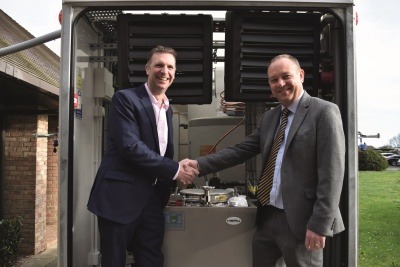Household waste disposal solution enters technical trials
A new domestic waste disposal appliance found to be less impactful in terms of CO2 emissions than more traditional waste collection methods by environmental consultants Ricardo Energy and Environment has gone out for technical trials this month as it continues its journey to market.
The HERU (Home Energy Resource Unit) uses low temperature pyrolysis to transform everyday waste (such as nappies, plastics and food) into a substance known as char, which releases oil and gas – the oil is cleaned and discharged while the gas is captured along with heat produced to power a domestic boiler. A single cycle of the HERU process can produce a 30ºC temperature rise for around 70 to 120 litres of water a day – equivalent to a full bath – is claimed to be able to help cut fuel bills by up to 15 per cent.

The report also stated that the HERU had 68 per cent less global warming impact than co-mingled collections and 32 per cent less than kerbside collections. When powered by solar energy, the HERU saw a 554 per cent decrease in global warming impact compared to kerbside collections and 733 per cent less than co-mingled collections.
The HERU is able to process is able to process all household waste streams except for glass and metal. The device is marketed as an end-of-life solution for the complex packaging, such as coffee cups and crisp packets, though questions remain over whether such a solution is more sustainable over the long term than increasing the recyclability of complex packaging, especially given its potential to divert recyclable materials collected at the kerbside away from established collection systems
The HERU has now gone out for a series of trials, co-funded by Worcestershire County Council’s (WCC) Low Carbon Opportunities Programme, with the appliance being tested at three distinct sites using three distinct inputs.
A trial at Hillers Farm Shop near Stratford-upon-Avon will see the HERU fed with commercial food waste and packaging, a unit at Rugby Borough Council will be fed with domestic housing resources and a unit at Wychavon District Council will be fed with waste office materials.
Commenting on the trials, Nik Spencer, founder and inventor of the HERU, said: “After hundreds of hours of rigorous testing at our engineering facility, where we basically tried our best to break it and find its weak points, testing all materials produced in the home. It’s exciting to now test the HERU in real-life scenarios and the data and feedback we get from these trials will mean we can take the final steps in bringing this innovative product to market.
“This disruptive technology is providing a completely new way of stopping waste arising, putting the decision to generate energy and reduce energy bills back into the hands of households and businesses.”
Ruth Corrall, WCC’s Low Carbon Opportunities Programme Manager, added: “Our business support programme, funded by the European Regional Development Fund, aims to help innovators bring low carbon, clean technologies to market. We were therefore delighted to support the development of the HERU in its trial phase. We hope that the trials will be successful and to see this technology adopted in homes and businesses very soon.”
The trials will last for approximately 10 months, with the installed units being monitored remotely in real time in order to assess progress around energy efficiency, usability and qualification criteria for the Renewable Heat Incentive for cardboard, paper, food waste and garden waste.
It is hoped that the diversity of applications and inputs involved in the three different trial locations will prove the all-purpose capability of the HERU. Councillor Carolyn Robbins, portfolio holder for corporate resources at Rugby Borough Council, said: “We’re delighted to support the trials of the HERU by installing a unit at one of our sheltered housing schemes. This ground-breaking invention has the potential to benefit both the council and our tenants by driving down the cost of fuel bills and reducing our carbon footprint.”
Vic Allison, Deputy Managing Director for Wychavon District Council, commented: “We are looking forward to the technical trial at Wychavon’s offices which will help to take the HERU to the next stage. We are keen to help make the HERU a commercial reality, bringing environmental benefits to us all.”
Emma Taylor, from Hillers Farm Shop, added: “We are delighted to be involved with trialing the HERU at our restaurant. As with any restaurant, we have food and packaging that often becomes waste, which is something we are continually trying to reduce. Having the HERU on site will massively prevent this resource from becoming waste in the first place. We are also keen to see less need to send away our recyclable items, so having a HERU on site will be incredibly valuable. We are extremely excited to benefit from the energy that will be produced by the synchronization to power our boiler and therefore the provision of free hot water. We look forward to being part of this incredible innovation.”







